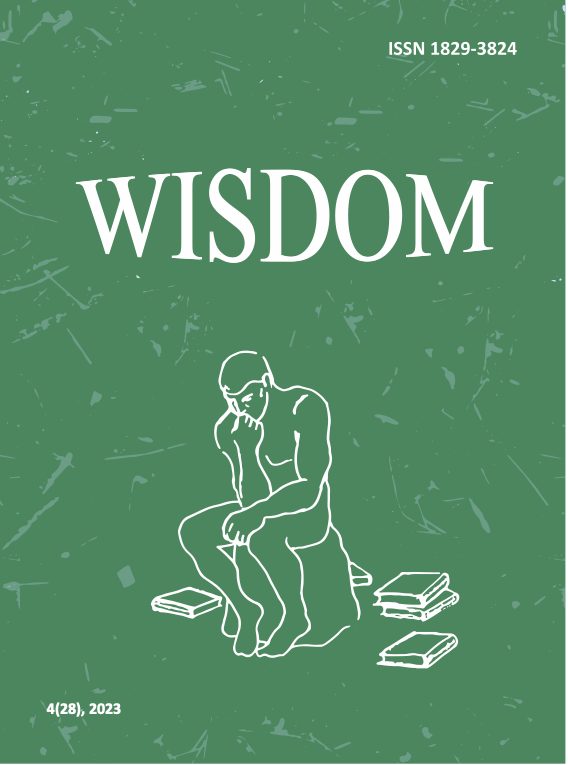Paradoxes of Human Cognition
DOI:
https://doi.org/10.24234/wisdom.v7i2.137Keywords:
human cognition, philosophy, truth, proof, contradiction, paradoxes of epistemology, paradoxes of methodologyAbstract
This paper presents the main paradoxes of the theory of human cognition, namely the paradoxes of epistemology and methodology. Each of paradoxes is given its laconic solution using a more strict definition of relevant concepts. Suggested solutions could be helpful in developing further the complete teaching of human cognition.
Downloads
References
Aristotle (1996). Physics. Oxford: Oxford University Press.
Aristotle (1998). Metaphysics. (H. Lawson-Tancred, Trans.) Penguin.
Bunge, M. (1962). Intuition and Science. Prentice-Hall.
Darwin, Ch. (1874). The Descent of Man, and Selection in Relation to Sex (2nd ed.). London: John Murray.
Darwin, Ch. (1958). The Autobiography of Charles Darwin 1809–1882. London: Collins.
Dawson, J.W. Jr (1997). Logical Dilemmas: The Life and Work of Kurt Gödel. Wellesley MA, A.K. Peters.
Descartes, R. (1637). Discourse on the Method, Optics, Geometry and Meteorology, (Revised edition 2001), Indianapolis: Hackett.
Djidjian, R. (1984). Metodologicheskii analiz processa otkrytiya i izobreteniya (Methodological Analysis of the Process of Discoveries and Inventions, in Russian), Yerevan, izdatel’stvo erevanskogo gosudarstvennogo universiteta.
Djidjian, R. (2002). The Secret of Geniality. Yerevan: Noyan Tapan.
Djidjian, R. (2004). Getting Ready for Great Discoveries. Yerevan: Yerevan state university publication.
Djidjian, R. (2011). Building the logic of scientific discoveries. Main Issues of pedagogy and psychology (pp. 164-173). ?3. Yerevan.
Gödel, K. (1931). Über formal unentscheidbare Sätze der Principia Mathematica und verwandter Systeme, I, Monatshefte für Mathematik und Physik, 38(1), 173-198.
Hegel, G. (1969). Science of Logic. Allen and Unwin.
Hershell, J. (1831). A preliminary discourse on the study of natural philosophy, part of Dionysius Lardner's Cabinet cyclopedia (1831, new edition 1840).
Hilbert, D. (2004). David Hilbert's Lectures on the foundations of Mathematics and Physics, 1891–1933, Springer-Verlag Berlin Heidelberg.
Hume, D. (1748). An Enquiry Concerning Human Understanding. London: A. Millar.
Itlis, H. (1932). Life of Mendel. W.W. Norton & Company, Inc., London.
Jung, C. (1964). Approaching the unconscious. Man and his Symbols. Doubleday
Kant, I. (1781). Critique of Pure Reason. Cambridge: Cambridge UP, 1998.
Kleene, S. (1952). Introduction to Meta-Mathematics. Amsterdam: North-Holland Publishing Company.
Mach, E. (1905). Erkenntnis und Irrtum. Skizzen zur Psychologie der Forschung. Leipzig: Verlag von Johann Ambrosius Barth.
Mill, J.S. (1843). A System of Logic, Honolulu: University Press of the Pacific, 2002.
Plank, M. (1949). Scientific autobiography. New York: Philosophical Library, 1968.
Poincare, H. (1946). The foundations of science. Washington, D.C.: University Press of America, 1982.
Riemann, B. (2004). Collected papers. Heber City: Kendrick Press.
Smith, P. (2007). An Introduction to Gödel's Theorems. Cambridge University Press.
Whewell, W. (1860). On the philosophy of discovery: chapters historical and critical. London.
Whitehead, A.N., & Russell, B. (1910-1913). Principia mathematica, Vol. 1-3, (1 ed.). Cambridge: Cambridge University Press.
Wright, von G.H. (1971). Explanation and Understanding. Ithaca, Cornell UP, 2004.
Zentall, Th.R., Wasserman, E.A., Lazareva,O.F., Thompson, R.K., & Rattermann, M.J. (2008). Concept Learning in Animals. Comparative cognition and behavior reviews, vol. 3, 13-45.
Downloads
Published
How to Cite
Issue
Section
License
Creative Commons Attribution-Non-Commercial (CC BY-NC). CC BY-NC allows users to copy and distribute the article, provided this is not done for commercial purposes. The users may adapt – remix, transform, and build upon the material giving appropriate credit, and providing a link to the license. The full details of the license are available at https://creativecommons.org/licenses/by-nc/4.0/.















